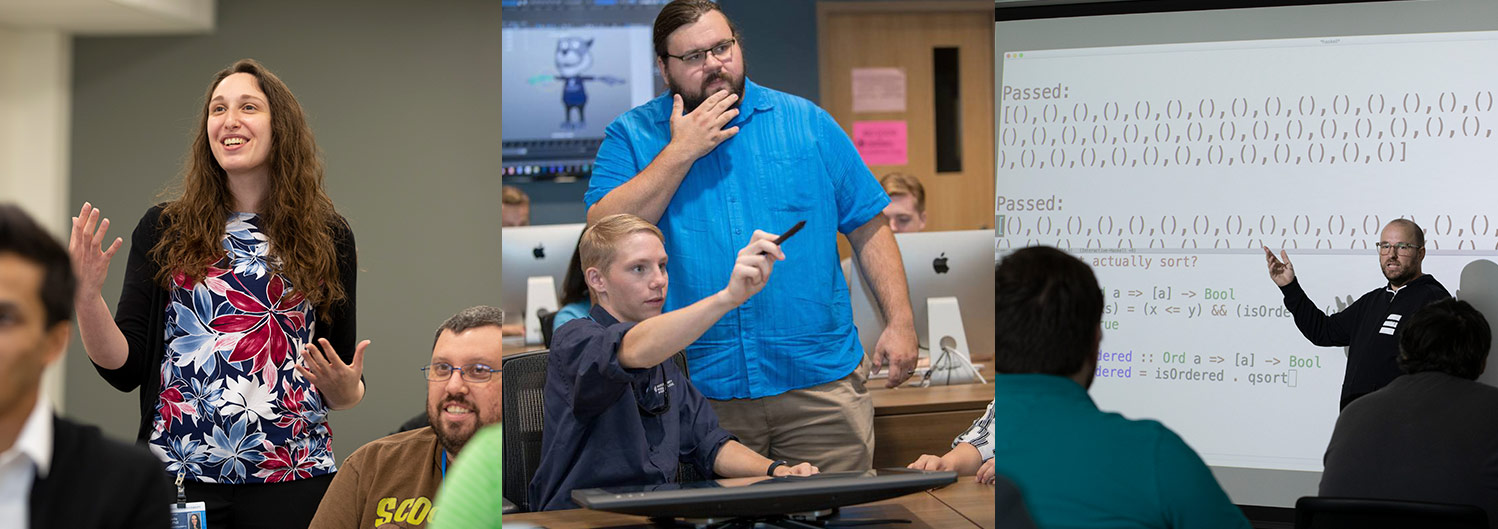
- Augusta University
- Community Engagement
- Faculty Resources
Faculty Resources
Our goal is to provide you with the resources you need to help you in your career advancement and professional development.
The terms "community" and "engagement" are often used, yet their meanings can vary widely. At Augusta University we have thoughtfully considered the concept of community engagement across several domains, including curricular engagement, partnership, outreach, and service.
In collaboration with the Augusta University Community Engagement Leadership Council (CELC)—a diverse, cross-campus committee of faculty, students, staff, and community members—we have developed clear definitions of community engagement. The CELC works together to promote community-engaged scholarship and to craft a unified narrative of Community Engagement at Augusta University. Additional faculty tools and resources may be found on the Faculty Resources page.
Contact Us
Community Engagement
Health Sciences Campus
706-721-3596
Scholarship & Practices Terms and Definitions
The following is a list of operating terms related to how community engagement is applied and utilized at Augusta University.
Community Engagement
Community engagement is any collaboration between institution of higher education and their larger communities (local, regional/state, national, global) for the mutually beneficial exchange of knowledge and resources in a context of partnership and reciprocity.
Community-Based Learning (Service-Learning)
Community-based learning, also known as academic service learning, is a high impact learning practice and form of experiential education in which students in a credit-bearing course engage in activities that address community priorities, a program of study that integrates service with student-learning outcomes, or a method of pedagogy in which service and learning are equally critical components.
Community-Based Learning/Service-Learning incorporates:
- Reflection activities to help students connect what they learn through their service with theoretical background that is set forth through course materials,
- Reciprocity between organizations being served and those engaged in service which promotes a sense of mutual responsibility and
- Learning Objectives (or learning outcomes) which clearly describe what students are expected to achieve as a result of the community-engaged instruction and/or experience.
With reciprocity and reflection, the service-learning activity enables students to collaborate with community partners to create sustainable long-term solutions to complex problems.
Curricular Engagement
Curricular engagement describes the teaching, learning, and scholarship that engages faculty, students, and community in mutually beneficial and respectful collaboration. Their interactions address community-identified needs, deepen students’ civic and academic learning, enhance community well-being, and enrich the scholarship of the institution.
Co-Curricular Engagement
Co-curricular engagement describes structured learning that happens outside the formal for-credit academic curriculum through training, workshops, and experiential learning opportunities. Co-curricular engagement requires structured reflection and connection to academic knowledge in the context of reciprocal, asset-based community partnerships.
Observership/Shadowing/Externship
An observership is most often found in a clinical/medical setting and is an educational experience (longer than a day but no longer than 4 weeks) that is restricted to watching and listening (eyes and ears only) during patient histories, physical examinations, procedures, surgeries, outpatient appointments, teaching rounds, and educational conferences. No hands-on experiences are involved. These experiences are unpaid and are generally more beneficial for the student than the medical organization. These experiences are not usually associated with course credit.
Job shadowing is similar in purpose, but generally is briefer in length than an observership. It can be as short as a few hours to several weeks depending on the career area being shadowed.
An externship is typically an unpaid shadowing of a respected industry professional during which the extern will observe daily duties ranging from about a day to eight weeks in a role that aligns to a specialized area within a field.
Internship
An internship is a form of experiential learning that integrates knowledge and theory learned in the classroom with practical application and skills development in a professional setting. Internships give students the opportunity to gain valuable applied experience and make connections in professional fields they are considering for career paths; and give employers the opportunity to guide and evaluate talent. Community-engaged internships can be paid or unpaid but must include additional engaged-learning or civic engagement benefit to the student beyond financial gain.
Clerkship
A clerkship is a full-immersion learning experience in a practice-based clinical facility, where students will have one-on-one patient interactions and application of clinical sciences skills. Community-engaged clerkship experiences are centered on reciprocity and reflection/learning outcomes for the students being integrated into the experience.
Outreach
Refers to the provision of programs, services, activities, and/or expertise to those outside the traditional university community of faculty, staff, and campus students. Outreach is typically one-way, with the university being the provider of knowledge or expertise to enrich the public good.
Volunteerism/Service
A non-curriculum, non-fee-based community involvement that provides community or societal assistance, ultimately aiming towards community and societal improvement. Exemplary efforts may be recognized through scholarships, awards, recognition, and other rewards.
Partnership
Sustained collaboration between institutions of higher education and communities for the mutually beneficial exchange, exploration, and application of knowledge, information, and resources. Examples include research, capacity building, or economic development.
Reciprocity
Reciprocity is the mutually beneficial exchange from each partner in the collaboration.
Practium
Practicums are field assignments that allow students to observe and document how working professionals perform their job duties. These students are assigned a limited number of tasks that are performed under the supervision of staff while enrolled in courses that reflect job duties, expectations and requirements.
Practicums share general characteristics, such as requiring the student to shadow assigned employees who explain their duties and work processes. These students must observe and correlate field practices with the theories and methods that are currently being studied. Practicum students must record their experiences and report to their mentor professor. Students visit the assigned workplace for two- to four-hour sessions that occur two or three times per week. Practicums do not provide stipends, but they do qualify for academic credit. They are often required for certain programs, such as accredited social work programs.
Instructional Innovation
Office of Instructional Innovation
Helping faculty thrive in physical and digital learning spaces
Our mission is to advance excellence in learning through collaboration with faculty, staff, and students. As a team with diverse talents, we are committed to a philosophy rooted in experiential learning, technology-enhanced teaching, and best practices in instructional design.

Help Make Augusta a Better Place